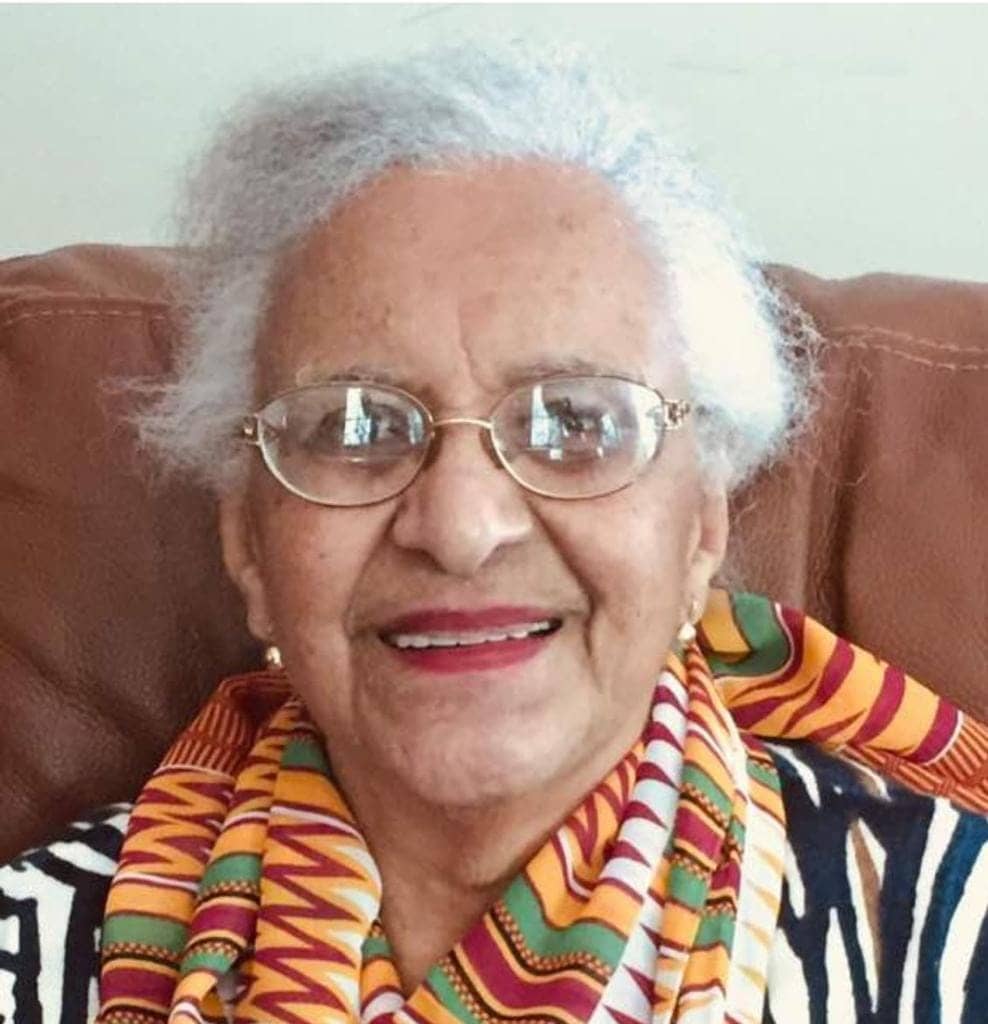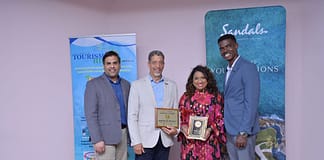
Ministry of Social Transformation and HR Development – Ruth Emily Henry was born at home at St Mary’s Street, on Wednesday 3 October 1923 at 9.30 a.m. to Roland and Therese Henry. She was the eldest of eight children the second of which sadly died in infancy.
Ruth attended Antigua Girls’ High School from May 1930 to December 1941.
In December 1940 she passed the School Certificate at the level required for exemption from the Matriculation of the University of London and obtained a Distinction in English Language.
She was a Prefect of the School. Ms Branch then Headmistress writes in her report:
“Ruth was an influence for good during her life at school. She is honourable, industrious, courteous and helpful.
She has a particularly bright and cheerful manner.
She showed a great interest in Social Welfare work while at School. In the last year of her School life she was awarded the prize offered by Lady Stockdale to the girl who had done most work for Social Welfare.
She has never lost this interest and has continued her work among the poorer girls of the community.”
In 1948 Ruth was selected to be Miss Antigua. She has always said she didn’t choose to be Miss Antigua it was a decision made for her by “the ladies”.
However no one has ever disagreed with the decision.
Ruth later left Antigua for New York. She took up a position in the Social Affairs Department of the Human Rights Division at the United Nations.
At the time the offices were situated at Lake Success.
The Headquarters later moved to midtown Manhattan in New York.
At the United Nations (UN) she worked with Eleanor Roosevelt and was involved in the draft of the United Nations Declaration of Human Rights.
Something Eleanor Roosevelt used to say that Ruth has never forgotten is – irrespective of race colour or creed people laugh and cry at the same things.
It was in New York that Ruth met Eric Adjorlolo a student from the Gold Coast who was studying Journalism at Columbia University.
They married in 1952 and following his graduation with two Masters degrees from Columbia the family moved to the Gold Coast in December 1955.
This was an exciting period in British colonial history as many of the now former British colonies were advocating self-rule and independence.
The Gold Coast gained independence from Britain on 6 March 1957.
Eric Adjorlolo at the time was Head of News at the then Ghana Broadcasting System.
As such Ruth and her husband were in the front line of all the activities. A once in a lifetime historical experience.
Not long after independence Ruth’s sister Gerda Hewlett and their two children accompanied her husband Cecil Hewlett a lawyer who had taken up a position in the Ghana legal service.
It was a time when many professionals from the Caribbean came to work in the newly independent country. Ruth enjoyed having her sister and family in Ghana.
Over the years Ruth has travelled extensively with her husband and on her own. The family lived in Montreal Canada for two years from 1964 to 1966. During this time Ruth undertook a course in Philosophy at McGill University.
Ruth has worked for a number of organisations in several roles mainly in public relations and media. These have included First Ghana Building Society, Shell (Ghana) Ltd, Union Carbide, Texaco.
In 1970 Ruth set up the first Zonta Club of Accra in Ghana. Zonta is an international organisation of professional women whose aim is to build a better world for women and girls through service and advocacy. The Club in Ghana has grown and gone from strength to strength.
Ruth was invited to carry out a UN project set up to train ladies in southern Africa in skills that enabled them to earn a living and provide for their families.
We mustn’t forget that like many in her family Ruth is a talented artist.
Art and painting is one of her passions. She set up the “Art Den” in an outhouse of their home in Accra where she offered art lessons.
As you can imagine there is much more that one could write. However it is best to quit when one is ahead. In conclusion lessons we take are that Ruth always made the most of every opportunity. There are always options and alternatives.
She is enthusiastic about learning and every day is school day. When life gives you lemons you make lemonade.
Ruth has a great sense of humour and a strong faith. These make life’s paths easier to traverse.
Advertise with the mоѕt vіѕіtеd nеwѕ ѕіtе іn Antigua!
We offer fully customizable and flexible digital marketing packages.
Contact us at [email protected]

















ONE THOUGHT OR TWO
“A people without knowledge of their past history, origin and culture is like a tree without roots”.
Congratulations on your 100 years of excellence!
Respect and honor Ruth Emily Adjorlolo (nee Henry), SGOE (Senior Grandparent Order of Excellence)!
Your life’s story highlights and underscores the significant, influential impact of the intersection of our history of Colonialism and the rise of Pan-Africanism in Ghana, Caribbean and the world.
You benefited from the educational opportunities provided by the Church – the Anglican Church (Church of England) – that established the top schools in Antigua, AGHS and AGS (Leeward Islands boarding school).
Those schools primarily leaned on the social hierarchical layering of the economic and education systems within our society for admission and graduation.
However, the Church’s mission was to Christianize the people, convert their spirit and control them, while providing schooling benefits.
You manifested social consciousness by working ‘among the poorer girls of the community’ and was selected by English ‘Ladies’ to be ‘Miss Antigua’ even though you never chose to be.
You were exposed to, and involved in the epitome of Pan-Africanism in Ghana.
Were your artistic expressions – paintings – ever publicly exhibited in Ghana?
Our native, venerable, noble Centenarians of our enslaved African ancestors had few and no choices within the economic and education systems of Colonialism and Slavery to earn a living: “Washing, cleaning, working in the canefield and picking cotton.”
Their labor produced the economic wealth and cultural benefits of our colonizers who purposely propagated their social ‘superiority’ behavior.
Our Centenarians survived by practicing the fundamental economic principle: “Eat a little, save a little, spend a little.”
And their African spirituality internalized hope of a better life, faith, by using the Church’s organized religion.
Let us interact with humility, grace, honesty, good intentions! …..Be nice to each other!
Save our Humanity, Save our Youths, Save our Environment, Save our Soil!!!
Respect
Comments are closed.